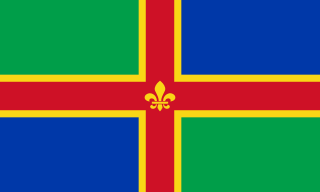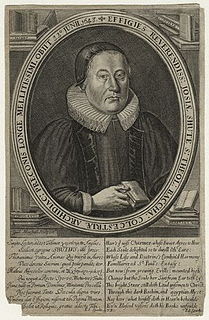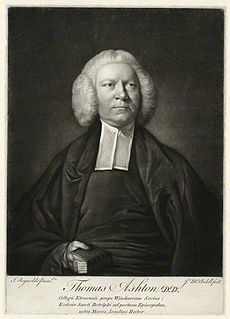Life
A native of Lincolnshire, he graduated M.A. at Oxford. [1] He held the mastership of Maidstone School in 1552, but emigrated to Frankfurt on the accession of Queen Mary. There he made the acquaintance of John Knox. He subsequently moved to Geneva.

Lincolnshire is a county in eastern England, with a long coastline on the North Sea to the east. It borders Norfolk to the south east, Cambridgeshire to the south, Rutland to the south west, Leicestershire and Nottinghamshire to the west, South Yorkshire to the north west, and the East Riding of Yorkshire to the north. It also borders Northamptonshire in the south for just 20 yards (19 m), England's shortest county boundary. The county town is the city of Lincoln, where the county council has its headquarters.

Frankfurt is a metropolis and the largest city of the German federal state of Hesse, and its 746,878 (2017) inhabitants make it the fifth-largest city of Germany after Berlin, Hamburg, Munich, and Cologne. On the River Main, it forms a continuous conurbation with the neighbouring city of Offenbach am Main, and its urban area has a population of 2.3 million. The city is at the centre of the larger Rhine-Main Metropolitan Region, which has a population of 5.5 million and is Germany's second-largest metropolitan region after the Rhine-Ruhr Region. Since the enlargement of the European Union in 2013, the geographic centre of the EU is about 40 km (25 mi) to the east of Frankfurt's central business district. Like France and Franconia, the city is named after the Franks. Frankfurt is the largest city in the Rhine Franconian dialect area.

John Knox was a Scottish minister, theologian, and writer who was a leader of the country's Reformation. He was the founder of the Presbyterian Church of Scotland.
Having returned to England Cole was presented to the rectory of High Ongar, Essex, in 1559. He was collated to the archdeaconry of Essex in the ensuing year, and subsequently appointed commissary of the archbishop in the archdeaconries of Essex and Colchester. In 1560 he was also installed in the prebend of Rugmere in St. Paul's Cathedral.

High Ongar is a village and civil parish in the County of Essex, England. It is located a mile (1½ km) north-east of Chipping Ongar, 8 miles (13 km) west of Chelmsford and 6 miles (10 km) north-west of Brentwood.

Essex is a county in the south-east of England, north-east of London. One of the home counties, it borders Suffolk and Cambridgeshire to the north, Hertfordshire to the west, Kent across the estuary of the River Thames to the south, and London to the south-west. The county town is Chelmsford, the only city in the county. For government statistical purposes Essex is placed in the East of England region.
Cole was present at the Convocation of 1563 and subscribed the original Thirty-nine Articles and the petition for discipline presented by the lower house. In 1564 he commenced D.D. at Cambridge, and the same year he was presented to the rectory of Stanford Rivers, Essex. He had a reputation for eloquence and also for a tendency towards nonconformity. He died in 1571.

The Convocation of 1563 was a significant gathering of English and Welsh clerics that consolidated the Elizabethan religious settlement, and brought the Thirty-Nine Articles close to their final form. It was, more accurately, the Convocation of 1562/3 of the province of Canterbury, beginning in January 1562.

The Thirty-nine Articles of Religion are the historically defining statements of doctrines and practices of the Church of England with respect to the controversies of the English Reformation. The Thirty-nine Articles form part of the Book of Common Prayer used by both the Church of England and the Episcopal Church. Several versions are available online.

Stanford Rivers is a village and civil parish in the Epping Forest district of Essex, England. The parish, which is approximately 11 miles (18 km) east from the county town of Chelmsford, contains the village of Toot Hill and the hamlet of Little End, both settlements larger than Stanford Rivers village, and the hamlet of Clatterford End. The village is 2.0 miles (3 km) south-east of Chipping Ongar, 3 miles (5 km) south-west of North Weald Bassett and 3 miles north-west of Kelvedon Hatch. The parish covers an area of 1,749 hectares.





